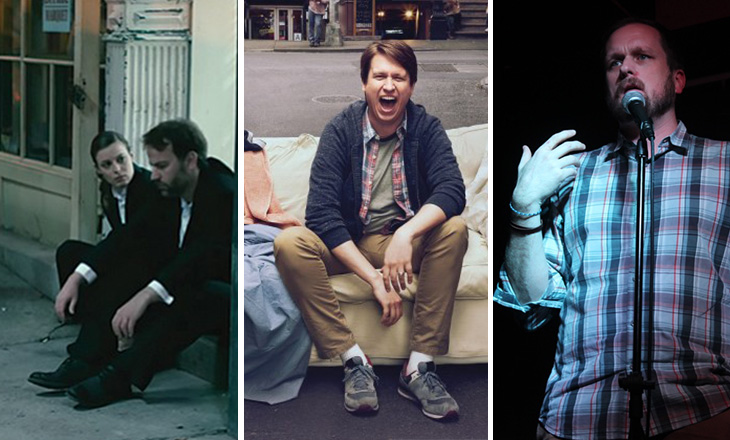A couple of years ago Cara Delevingne, the model turned actress and star of Paper Towns, had an awkward interview. It got enough attention that the ladies of The View were talking about whether or not she had been rude. Someone pointed to the burdens of being famous to which Whoopi Goldberg said, “She’s not famous. Honey, I’m famous.”
This occurred to me when I saw Mike Birbiglia’s Don’t Think Twice last fall. It also occurred to me when I saw the new Pete Holmes show Crashing. Whenever I see a successful comedian making a movie about unsuccessful comedians, I think of that Whoopi line and think, “You’re not unsuccessful. Honey, I’m unsuccessful.”
The more I’ve thought about this, though, the more complicated it’s become in my mind. I don’t doubt that Holmes and Birbiglia struggled. It’s also not up to me to decide what kinds of stories they want to tell. Just because a filmmaker or show runner is past a certain phase in his or her life doesn’t mean they can’t tell that story anymore. If that were true, adult Paul Fieg and adult Judd Apatow wouldn’t have made Freaks and Geeks.
It still just bothers me, though.
I don’t remember everything about Don’t Think Twice but I do remember feeling terrible leaving the theater. The movie seemed to judge people for doing improv too late into life. Since I don’t want to watch the movie again, I just watched the trailer again and was struck by two lines in it. The first was Keegan-Michael Key’s, “You can’t do improv forever, okay? It just… it ends.” And then Chris Gethard saying, “Your twenties are all about hope and then your thirties are all about realizing how dumb it was to hope.”
It was Mike Birbiglia’s character Miles that rattled me the most. Miles was a 36 year old improv teacher who lives in a shabby apartment, perpetually hits on students, and never really got over not getting cast on Weekend Live, the movie’s stand-in for SNL. Miles’s redemption finally comes when he decides to settle down with an ex-girlfriend and raise her child with her. Miles, in addition to conforming to the ubiquitous movie trope that a man is merely a man-child until he starts a family, is forced to reckon with the fact that he’s not that good at comedy and should really move on.
The strangest plot point of the movie was the fact that the Key’s character, the guy who “made it”, who got cast on Weekend Live, ended up the most unhappy person at the end of the movie. That was when I had a moment akin to Fred Savage in The Princess Bride, “Jesus, Grandpa, what did you even read me this for?!”
It wasn’t lost on me that Gillian Jacobs’s character was perfectly satisfied with her life pursuing improv as an art form. I’m also not so obtuse that I don’t realize that my reaction to this movie is clearly influenced by my own issues about success and growing up.
Still. It just bothers me, though.
It might be that I know Birbiglia’s career pretty well. We crossed paths, sort of, when I started doing stand-up. He was doing a set the night I auditioned at the Comic Strip for the first time. He was also simply everywhere on the stand-up scene in New York in the early 2000s. He was on Comedy Central. He was on Letterman. He cut a couple of comedy albums. I went to see his CD release party at The Comic Strip where he shared the stage with Mitch Hedberg. He was a real comedian. Then he – quite bravely – altered his path and started a more storytelling kind of comedy. I listened to his album Sleepwalk With Me dozens and dozens of times. It’s really fantastic. This led to Birbiglia, at the age of 34, directing the film version of Sleepwalk With Me, produced with Ira Glass.
So, long story short, he doesn’t know what it’s like to be an unsuccessful improviser at 36. So, the character of Miles feels like a judgement that he shouldn’t be making. Again, this is coming from an unsuccessful improviser on the edge of 40.
Pete Holmes’s Crashing is a half-hour show on HBO about a stand-up struggling early in his career and in the wake of his wife leaving him.
I’ve paid attention to Pete Holmes’s career as well because I remember him from my open mike days at The Parkside Trainwreck, a little later in the early 2000s. He had just moved here from Chicago and he was already good. I saw him in some online shorts and then I saw him on TV. I saw his TBS show. (Well, I saw that he had one.) I enjoyed his recent HBO special. And now here he is making a show with Judd Apatow about an unsuccessful comedian.
I’ve enjoyed the first two episodes. It’s also not exclusively about stand-up. If you’ll allow me to project a little, Holmes might have some stuff to unpack from his divorce – something I don’t think he talks about too much. That facet of the show is interesting and I particularly appreciated seeing a naked George Basil as the instrument of the fictional marriage’s dissolution.
But if you’re going to do something about amateur stand-ups, I’m going to be watching closely to see that you do it right. Like Jerry Seinfeld pointing about about the stand-up club in the movie Punchline, uh, there aren’t lockers. And mastery isn’t a montage away.
They did get one thing right. The scene in which Pete is brought up to the stage by Todd Montesi – a real New York comedian who I also recognized from the open mike scene – and then does his decent jokes, unconfidently, to relative silence in a dark basement was stunningly accurate.
The other stuff that happened, though, is fantasy. Pure, Penthouse Forum level fantasy.
Pete hangs out at the bar of a comedy club in the village, trying to ingratiate himself with some comedians. It turns out that one of the comics is late and they need a comic to fill in. Hey, Pete, you’re an open miker and I’ve never seen you do comedy before ever, can you do it?
Yeah, no. Just no. If that ever happened to an open miker, just once, we all would have just hung out at every comedy club bar like feral cats.
Afterwards, Greer Barnes, upset that his spot was taken tells Pete that he sucks and that he should quit comedy.
Again, no.
To tell someone they suck actually takes some form of acknowledgement of that person, even a modicum of respect. In my experience, comedians who had been on TV never spoke to an open miker. The comedy caste system is rigid. There are your peers, the people above you, and then, beneath you, the comedy untouchables.
This makes the other plot point in the pilot as fantastical. Artie Lange approaches Pete and they begin a friendship. “Hey, I’m Artie Lange, I saw your set…”
Nope.
That mentorship where a comedian takes another comedian under his wing thing? I never saw it. You do your sets, you make friends with your peers but that, “Alright, kid, lemme teach some things and maybe you could open for me,” thing doesn’t happen.
Crashing is fiction and things need to happen in a show to further the story. I get that. But it’s myths like that – in addition to the myth of the agent in the back of the room who will “discover you” – that torture young comics.
The more I thought about this stuff, though, the more I thought that maybe it’s my attitude and my perception of success that’s the problem.
I think all people look forward. I remember reading a profile on Conan O’Brien when he was still doing The Late Show on NBC and I got the impression that he didn’t feel like a great success. He was looking at Leno and Letterman. There was even a line in the piece about not even mentioning the words “Jon Stewart” around him.
When Aziz Ansari won an Emmy for Master of None, along with Alan Yang, he thanked Mike Schur for giving him a chance.
A chance.
He received the Emmy in 2016. By that time, Aziz had the sketch show Human Giant on MTV, had been in several movies, starred in Parks and Recreation, and sold out Madison Square Garden. But still, he said thanks or the chance.
Now, as a white guy, I can’t speak to what it must have been like for two Asian comedy writers to write about themselves in a way that they had never seen on TV before. I’m sure that was a big part of it. But it also made me wonder what Aziz’s idea of success was. Maybe starring in a show that he hadn’t created himself was only a step on the way to his real dream. Perhaps that striving to move forward is what makes the great ones great.
Above I said that the mentorship thing never happens but then I remembered something that happened early in my stand-up days.
One time I did a bringer, when I thought that bringers would get me somewhere, at The Comic Strip and it was hosted by Rachel Feinstein. She was one of the comedians in the bar in the pilot of Crashing. She’s great. She was in a special with Amy Schumer and I believe she has her own special coming out this April. She saw my set and was really sweet to me. She invited me to do a show of hers at a bar. The bar only had four people and they barely laughed at my jokes. She gave me five bucks.
I didn’t realize that being paid anything at all for a show was a miracle. And those little gigs in bars where only four people show up? Those are all you get for a long while. I never really followed through with that friendship or connection. Maybe my attitude was wrong or maybe I wasn’t so hungry for comedy that I looked for more opportunities like that. I’m not sure but when I think of stuff like that, I realize that, for better or worse, I’m where I’m supposed to be.
So, I found myself thinking why are these successful people making these things about unsuccessful people? But that’s my viewpoint and it’s not really fair. In their minds, they might see themselves as struggling and trying to get to the next level.
Like I said, people always look forward. I always look at the people ahead of me and think why aren’t they happier with their success? And yet I constantly call myself unsuccessful. I need to stop that. It’s getting old. I’m on a house team at an improv theater. I coach improv. I’ve started a storytelling show. I’m in a spot that I would have loved to have been in years ago.
I’ll say this for Don’t Think Twice. At the end, all of the characters move forward in their creative lives their own way. No matter your level of perceived success, that’s really all you get.




